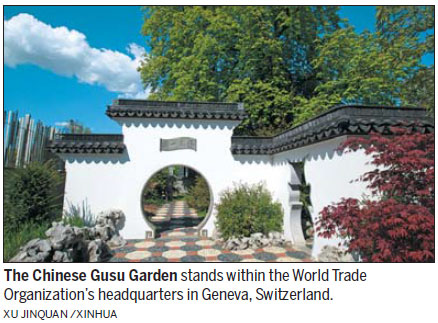Chinese-style gardens spread traditional culture worldwide
A traditional Chinese-style garden, featuring Suzhou's signature architectural designs such as pavilions, bridges, corridors, rockeries and a variety of window and door patterns, stands right inside the World Trade Organization's headquarters in Geneva, Switzerland.
The Chinese Gusu Garden opened in 2013. It is named after ancient Suzhou, a city famed for its silk and well-preserved ancient gardens in Jiangsu province. As a gift from the Ministry of Commerce and the Suzhou government to the WTO, the garden symbolizes China's confidence in the multilateral trading system, Chinese media reported.
A traditional Suzhou garden is a cultural complex, combining technology and art, said He Fengchun, president of the Suzhou Garden Design Institute, a company licensed to design and build overseas projects.
"Building Chinese gardens abroad is a good promotion method, which enables visitors to have a better understanding of our traditional culture," He said.
"Visits to the gardens help to learn about Chinese perspectives of the world and nature. Our people's pursuit of peace, beauty in life and harmonious coexistence with nature is reflected in our gardens' designs."
Since the first overseas Suzhou-style garden opened in New York in 1980, scores of Chinese parks have been built across the world in recent decades.
About half of them were developed by the Suzhou institute, according to the company.
"We took local residents' lifestyles and cultural needs into consideration while developing our overseas property projects," He said.
"They are no longer just private gardens as they were built in China, but can be used as a venue for a wedding ceremony, Chinese cultural research, a tea party, a concert or a company's annual conference," she added.
The gardens have subtly integrated themselves into local communities and served as ambassadors of Chinese culture, she noted. "The continuous force of driving cultural exchange is immeasurable."

























